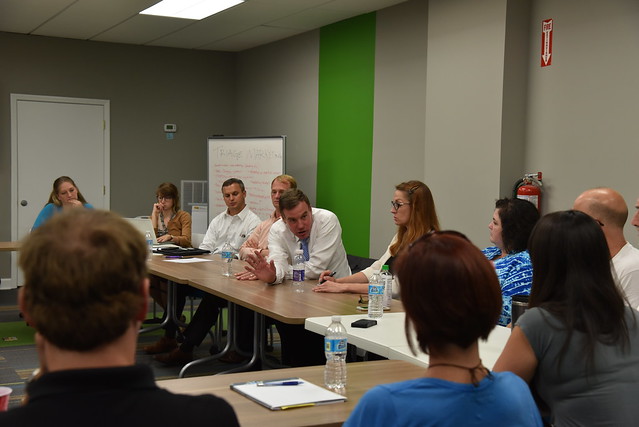Priorities

By Alicia Petska
When Lauren Ricci was laid off last summer — the second layoff in as many years for the nonprofit administrator — she found herself doing a lot of soul searching.
“I think it pushed me,” she said. “It made me think more creatively and take a risk I never would have before. … I had to ask myself: What’s going to make me happy?”
Cut to this summer, when Ricci runs her own Etsy shop selling restored vintage clothes, a longtime passion she hopes to turn into a booming business.
She loves the work and the freedom that comes with being her own boss. But that’s not to say there aren’t some things that keep her up at night.
If something goes wrong, Ricci knows she has no company safety net — no unemployment benefits, no workers’ compensation — to fall back on.
“If I get injured,” she said, “I’m in a lot of trouble.”
This high-wire act is something U.S. Sen. Mark Warner, D-Va., spotlighted Wednesday when he held a roundtable with about 20 entrepreneurs from Roanoke.
The rising popularity of services like Uber, Etsy and Airbnb is fueling a new “on-demand” economy staffed by people who enjoy more freedom than a typical 9-to-5 worker but who also get fewer protections.
As a policymaker, Warner said, he’s searching for ways to bridge that gap.
“How do we allow this innovation to keep going and allow people to keep trying things, but also at least put in some guardrails,” he asked during Wednesday’s event at Grandin CoLab.
Warner joked he didn’t have the “three-point” solution to the problem yet, but he hopes to start putting out proposals in the next three to six months.
Possibilities include promoting “hour banks” — a concept already used in the construction industry — to administer benefit plans for workers or offering customers the option of leaving a tip that gets paid into a benefits fund.
There also should be a national regulatory framework to avoid the state-by-state disputes cropping up in the courts now, he said.
“I’m trying to think this through,” he said, adding policy needs to keep pace with this new economy.
On-demand jobs are one of the fast-growing sectors of the economy. For some, it’s a matter of financial necessity — a way to make ends meet.
But for many of those gathered Wednesday it was a choice —a chance to pursue a dream or run their own business.
Warner asked how many would trade their current jobs for a 9-to-5 gig. People shook their heads. What if they could make 10 percent more a year? 20 percent? 30 percent?
As the number rose, people started to relent, but they still wanted to know if the job would be fulfilling and would offer them a healthy work-life balance.
That is reflective of a growing shift in how people, particularly millennials, think about work, Warner said, and leaders ignore it at their own peril.
Some politicians want to “turn back the clock,” he said. “That’s not where I’m headed.”